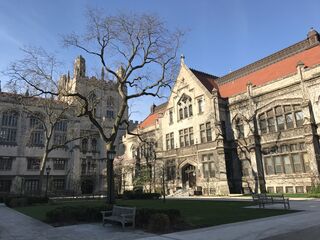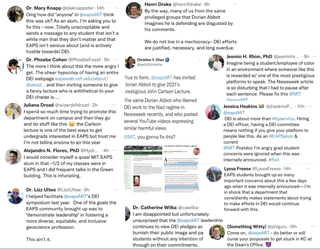Bias
Diversity, Equity, and Inclusion: Commitment or Cult?
DEI efforts are important. But discussion and disagreement must be permitted.
Posted October 12, 2021 Reviewed by Ekua Hagan
Key points
- The rejection of scholars who question diversity, equity, and inclusion (DEI) practices has the quality of a cult.
- Universities not allowing visiting scholars who criticize DEI policies to come speak on unrelated topics implies they are "morally polluted."
- Diverse and inclusive school communities will not be possible until everyone is able to discuss, debate, and disagree with DEI policies.

Cults rely on a closed system of logic in which questioning dogma is an indication that something is inherently wrong with the questioner. If your institution rejects scholars’ expertise in their fields of study because they question current diversity, equity, and inclusion (DEI) practices, perhaps your institution's DEI efforts have become a cult.
Case in point: The Massachusetts Institute of Technology (MIT) recently disinvited University of Chicago’s Dorian Abbot, a tenured professor of geophysical science, because of his criticism of current DEI policies. As Abbot presciently observed in the fall of 2020, “The current academic climate is making it extremely difficult for people with dissenting viewpoints to voice their opinions.”
In November 2020, Abbot shared his concerns about the University of Chicago's DEI framework. “Let’s fight bias in science by working hard to reduce bias, not by introducing it.” Students and post-doctoral fellows at the University of Chicago petitioned the administration to sanction him. They claimed his views “undermine[d] Equity, Diversity, and Inclusion initiatives” and in so doing, “threaten[ed] the safety and belonging of all underrepresented groups within the department.” In response, then-president Robert Zimmer (now the chancellor) made it clear that the university protects the right of professors to openly criticize university policies without fear of retribution.

“We believe universities have an important role as places where novel and even controversial ideas can be proposed, tested and debated,” Zimmer proclaimed. “Faculty are free to agree or disagree with any policy or approach of the University, its departments, schools or divisions without being subject to discipline, reprimand or other form of punishment.” He added, “no individual member of the faculty speaks for the University as a whole on any subject, including on issues of diversity … The University will continue to defend vigorously any faculty member’s right to publish and discuss his or her ideas.”
After the administration’s clear and forceful response, the controversy quickly died.
In July, Abbot was confirmed as MIT’s 2021 Carlson Lecturer in the Department of Earth, Atmospheric and Planetary Sciences to speak about “climate and the potential for life on other planets.”
Weeks later, he and Stanford Business School professor Ivan Marinovic published an op-ed in Newsweek. They argued that DEI as currently implemented on campus “violates the ethical and legal principle of equal treatment,” “compromises the university's mission,” and “undermines the public's trust in universities and their graduates.” They proposed an alternative framework of Merit, Fairness, and Equality (MFE) “whereby university applicants are treated as individuals and evaluated through a rigorous and unbiased process based on their merit and qualifications alone.” (For discussion of the article, see Yascha Mounk's recent essay in The Atlantic.)

In an unintentional nod to the cultish nature of this cancelation attempt, someone tweeted to the department, “do better or will curse your proposals...” (emphasis added). Among complaints about Abbot’s invitation were claims that his views are “harmful,” his invitation was “totally unacceptable,” and that many were “disgusted.”
In the face of the protest, the department chair at MIT canceled the lecture.
Illiberal "monomania" and moral pollution
The opposition to Abbot's presence on campus is an example of the illiberal “monomania” social psychologist Jonathan Haidt recently wrote about.* It is also an example of moral pollution, the sense that someone or something becomes morally contaminated from contact with something morally impure. Disgust, which was mentioned by at least one protester, is a moral emotion triggered by moral impurity in the same way it is triggered by things that are physically contaminated, such as spoiled food, vomit, feces, and toxic substances.
As Yascha Mounk recently noted in The Atlantic, this was not like most previous cancelations in which the content of a speaker’s lecture was at least part of what protesters found objectionable. In this case, however, Abbot’s ideas about DEI are so taboo that even though he was invited to speak about his entirely unrelated area of expertise, the extent to which he is himself morally polluted to those who adhere to a certain mindset meant that his presence would morally pollute the department, the campus, and anyone who might hear him speak. DEI efforts at MIT and other institutions have become a cultish monoculture in which dissent is blasphemy and heretics must be excommunicated.
(Professor Robert George subsequently invited professor Abbot to deliver his lecture at Princeton on the day it was to be delivered at MIT.)
The tendency to moralize is destructive and must be actively restrained in any arena in which excellence is valued. On campus, not only does it damage the ability of educational institutions to fulfill their intellectual purpose, it prevents the very things adherents want to accomplish.
Until we are all able to discuss, debate, and disagree with DEI policies and even basic premises, we will not be able to create diverse and inclusive school communities in which everyone has the support to succeed. We will only see more disinvitations — along with an unwillingness to hire, cite, or even be seen in public with academics whose scholarship might be laudable or even exceptional, but who fail the newest purity test.
♦
Pamela Paresky, PhD, is Visiting Senior Research Associate at the Stevanovich Institute on the Formation of Knowledge at the University of Chicago, Senior Scholar at the Network Contagion Research Institute, and the author of the guided journal, A Year of Kindness. Dr. Paresky's opinions are her own and should not be considered official positions of any organization with which she is affiliated. Follow her on Twitter @PamelaParesky, on Clubhouse @Paresky, and subscribe to her Newsletter: Paresky.Substack.com
References
* Haidt, J. (2021) Monomania Is Illiberal and Stupefying
https://www.persuasion.community/p/haidt-monomania-is-illiberal-and




